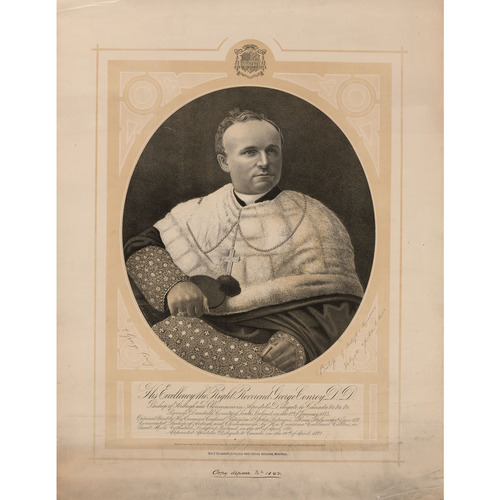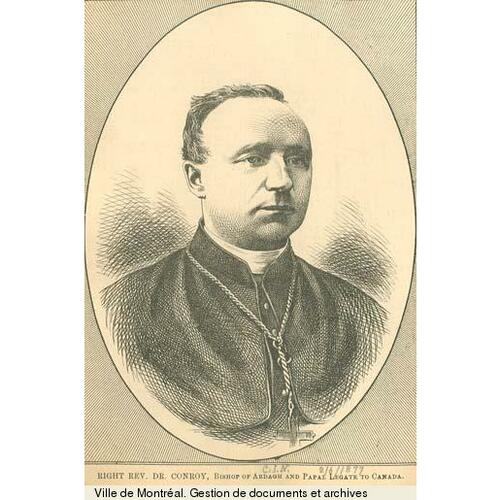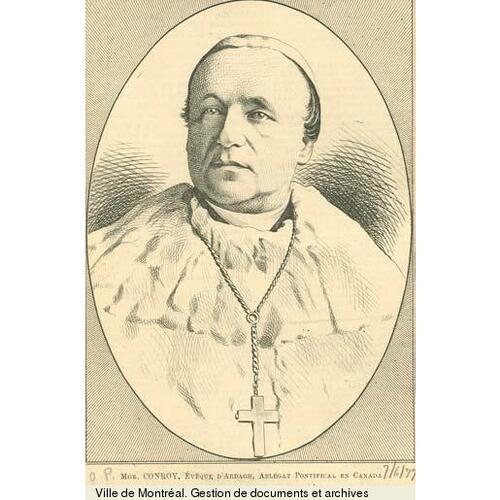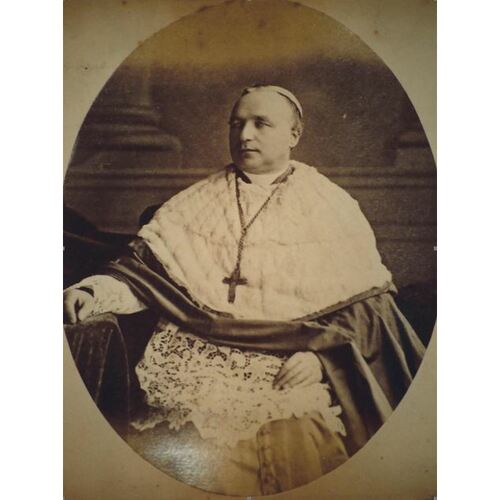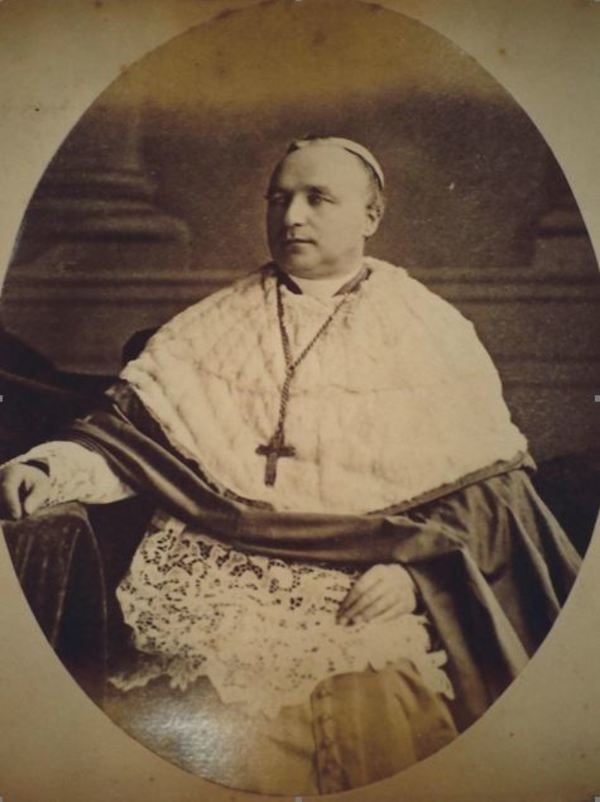
Source: Link
CONROY, GEORGE, priest, Catholic bishop, and apostolic delegate to Canada; b. 31 Dec. 1832 at Dundalk, County Louth, Ireland; d. 4 Aug. 1878 at St John’s, Newfoundland.
Born of a northern Irish family of modest means, George Conroy went to primary school in the primatial town of Armagh, then, at 17, went to Rome to complete his studies at the College of the Propaganda. On 6 June 1857 he was ordained priest at the church of St John Lateran by Cardinal Constantin Patrizi; in the same year he returned to his native country and was appointed to All Hallows’ College, which was situated near Dublin and had been founded for the education of priests intending to serve with foreign missions. In 1866 Cardinal Paul Cullen of Dublin, who had known him at the college of Armagh, appointed him his private secretary; the young Father Conroy was also teacher of theology at Holy Cross College in Clonliff and editor-in-chief of the theological review, Irish Ecclesiastical Record (Dublin). After Bishop Cornelius MacCabe’s death, Conroy was appointed to the combined sees of Ardagh and Clonmacnois, with residence at Longford, and on 11 April 1871 was consecrated bishop by Cardinal Cullen. It was from this post that he was summoned by Pope Pius IX to be the first apostolic delegate to Canada.
Bishop Conroy arrived at Halifax on 22 May 1877, and immediately set to work. His instructions, which remained secret until 1881, specified that he was to repair the divisions among Canadian bishops “in regard both to the political question and to other questions which are being heatedly discussed in Canada at the moment,” such as the Université Laval, the Catholic Programme, and “undue influence.” He was to put an end to “the excessive intervention of the clergy in political affairs,” and to exhort the bishops to prudence in their relations with the state. Whereas the ultramontanes – bishops such as Ignace Bourget* of Montreal and Louis-François Laflèche* of Trois-Rivières, laymen such as François-Xavier-Anselme Trudel* and Joseph-Israël Tarte* – wanted to see the liberals condemned once and for all, Bishop Conroy endeavoured to make it clear “that the Church, in condemning liberalism, did not wish to censure all and each of the political parties who chanced to be called liberal.” To this end he travelled through all the dioceses, met clergy and lay personalities, and presided over several meetings of Canadian bishops.
One of the first results he obtained was the publication, on 11 Oct. 1877, of a collective pastoral letter which recalled the various condemnations pronounced against Catholic-liberal doctrines, but which left “to the conscience of each to judge, under God’s eye, what sort of men may be the subject of these condemnations, quite apart from the political party to which they belong.” Soon the bishops appeared to be more united, the clergy was instructed no longer to interfere in political questions – there were, however, a few difficulties at the provincial elections of 1878 – and peace between church and state seemed to have returned in Canada. But it was precarious, for the ultramontanes, headed by Bishop Jean-Pierre-François Laforce* Langevin, argued that Bishop Conroy had been taken in by the liberals and had dangerously throttled “the salutary influence of the clergy.” And they prepared to counter-attack. The aged Côme-Séraphin Cherrier* was not mistaken in saying to the delegate when he left: “Do you not know, Your Excellency, that they are only waiting for your departure to disobey you?”
Bishop Conroy set off from Canada for Rome, via Newfoundland, in June 1878. He left the memory of a “high-minded and conciliatory person,” possessed of “an evangelical prudence” and admirable wisdom. The announcement of his illness created consternation among those who knew him; greater still was the surprise when news came of his death on 4 August. As a Quebec liberal paper, L’Événement, said: “This death is a public affliction, and affects us as if it were striking down one of our own priests.”
ASTR, Fonds Louis-François Laflèche. Le Journal des Trois-Rivières. Mandements des évêques de Québec (Têtu et Gagnon), VI. Robert Rumilly, Monseigneur Laflèche et son temps (Montréal, [1945]), 128–46. Savaète, Voix canadiennes, X.
Cite This Article
Nive Voisine, “CONROY, GEORGE,” in Dictionary of Canadian Biography, vol. 10, University of Toronto/Université Laval, 2003–, accessed December 31, 2025, https://www.biographi.ca/en/bio/conroy_george_10E.html.
The citation above shows the format for footnotes and endnotes according to the Chicago manual of style (16th edition). Information to be used in other citation formats:
| Permalink: | https://www.biographi.ca/en/bio/conroy_george_10E.html |
| Author of Article: | Nive Voisine |
| Title of Article: | CONROY, GEORGE |
| Publication Name: | Dictionary of Canadian Biography, vol. 10 |
| Publisher: | University of Toronto/Université Laval |
| Year of publication: | 1972 |
| Year of revision: | 1972 |
| Access Date: | December 31, 2025 |


